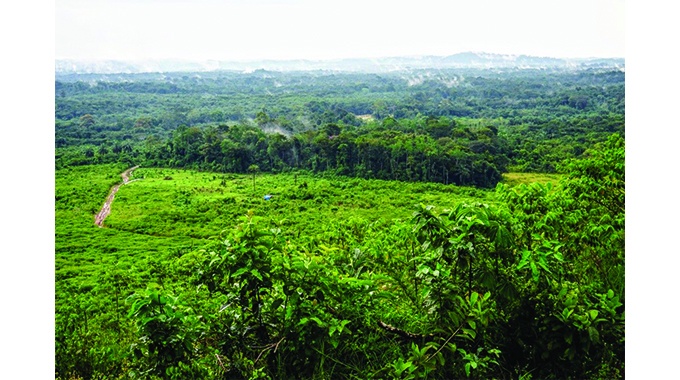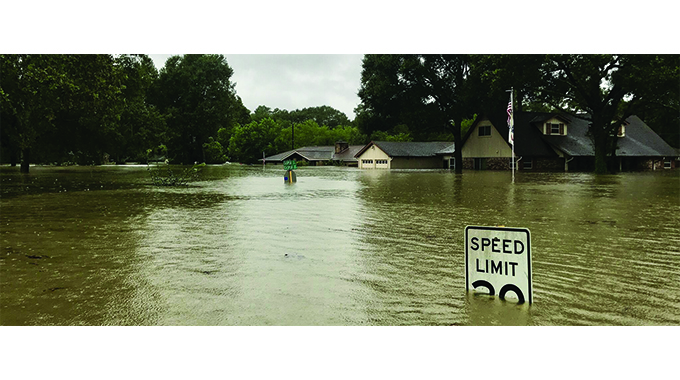Preserve forest ecosystems to sustain livelihoods

Luckson Pasipanodya, Correspondent
THE development of communities and sustainability of livelihoods is largely reliant on forest ecosystems. In Zimbabwe, many people in rural and urban areas rely on natural resources for their day-to-day living.
The destruction of forest ecosystems and changes in climatic conditions therefore affect people’s livelihoods directly.
Forest ecosystems are currently under threat ranging from natural to anthropological and have reduced the human-forest interaction and dependence.
They are being destroyed at an alarming rate across the world. The 2010 statistics from the Food Agriculture Organisation (FAO) show that about 13 million hectares of forests globally were converted or lost annually from 2000 to 2010. The destruction of forests shows the extent of decline of livelihoods that survive on forests and ecosystems in a decade. Such has led to an increase in human vulnerability to climate risks such as drought and floods in the world and in Zimbabwe in particular.
The decline in forests also affect the interaction of vital biotic (living) and abiotic (non-living) organisms like people, plants, animals, water, soil, and rocks and the atmosphere to produce a healthy environment.
The imbalance leads to negative interaction and results in problems such as deforestation, soil erosion and food insecurity.

Cyclone – Image taken from Shutterstock
These problems result in loss of plant and animal life which disrupts the livelihoods — ecosystem dependence network. In a bigger sense, the lack of preservation mechanisms has had a huge impact on the livelihoods sustained by the forests.
The benefit of forest ecosystems to human basic needs provision and health, has been well acknowledged for many years. If managed properly, their ability to sustain livelihoods may not be a challenge.
Forests can mitigate the impact of natural disasters including flooding, hurricanes and cyclones and make a valuable contribution to human resilience. This is because climate change threatens everyone within a particular area, but does not threaten all people equally. Rural communities are more vulnerable to climate change as they are dependent on forest-based ecosystems. In developing countries like Zimbabwe people secure food, water and energy from forest ecosystems which ensure food security.

Flooding
The society’s vulnerability and capability to cope with diminishing forest ecosystems is so huge that it alters many livelihoods. It is for this reason that forests should be managed effectively.
While climate change results in varying depressive impacts on the environment from which the society relies on, environmentally sensitive spaces need to be taken care of than destroyed. Forest ecosystems are usually expected to provide a safety net and cushion communities against the impacts of climate change inclusive of high temperatures, inconsistent and unreliable rainfall or increased rainfall that may lead to flooding as traditionally experienced in Tsholotsho, Matabeleland North. Their deterioration should therefore be halted as they make food insecurity more apparent especially in rural areas.

climate change
Climate change therefore increases related hazards which lead to higher levels of exposure for the communities, especially the poor. It is with that in mind that the Environmental Management Authority was established to provide sustainable management of the natural resources and protection of the environment as well as prevention of pollution and environmental degradation.
In areas that receive increased rainfall and have no forest cover, there is always destruction of crops due to excessive run-off leading to reduced yields. Successive food insecurity induced by climate change leads to malnutrition. The increased disharmony between people and the natural ecosystems supporting livelihoods has led to legal and traditional conservation measures.
Forests provide a lifeline for the communities’ socio-cultural and economic sustenance and any activity that disturb the natural ecosystem be it mining or farming should be regulated with that balance in mind. The concept of land use change through shifting agriculture practices has led to deforestation.
Human activities are highly exerting stress on the environment as a result of the use and processes adopted. In the Democratic Republic of Congo (DRC) communities are benefiting from forests through a strict legal regime.
This has seen the preservation of animals and trees species of economic and cultural significance. Zimbabwe also has a brilliant piece of legislation but it is through its implementation that it can manage its forest ecosystems.
With EMA, law enforcement agencies and the community, the country can do well in the protection of its forests. People in Matabeleland provinces for instance depend on seasonal mopane worms/caterpillars (amacimbi) gathering, preservation and selling which has transformed their livelihoods.

Mopane worms/caterpillars (amacimbi)
However, due to the diminishing forest ecosystems there is an impending threat which is likely to impoverish households dependent on amacimbi as relish and a source of money. The declining rainfall due to climate change has reduced availability of amacimbi. Consequently, this limits food access opportunities for families’ nutritional benefit while increasing vulnerability of communities economically.
The country should therefore ensure that some tree species are protected as some people resort to unsustainable ways of harvesting amacimbi such as cutting mopane trees to harvest the caterpillars. Although shifting agriculture has declined significantly in Zimbabwe, communities still need to be conscientised on the need to preserve forests even in new lands opened up for agriculture. Much more deforestation occurs through shifting agricultural practices.
The practice involves the clearing of a piece of land and its cultivation for a few years and abandoning it for a new area when the soil nutrients are exhausted. It is practised in northern Zambia in Luapula district by the Bemba-Ushi people, parts of Mozambique, Malawi and Tanzania and in the Amazon forest putting forests under threat.

Agriculture
It largely involves the cutting down of trees and burning of bushes to clear land for agriculture and in doing so, livelihoods are altered largely.
Again, ecosystems are destroyed as a result shortage of electricity, mining and primitive hunting expeditions. These have seen an increase in deforestation which has resulted in desertification whose net effect is felt on the development and sustainability of livelihoods depending on forest ecosystem.
It’s time for citizens to take stock of their actions and move towards environmental protection where everyone must be accountable. Zimbabweans need not continue sacrificing its forests on the alter environmental damaging development.










Comments